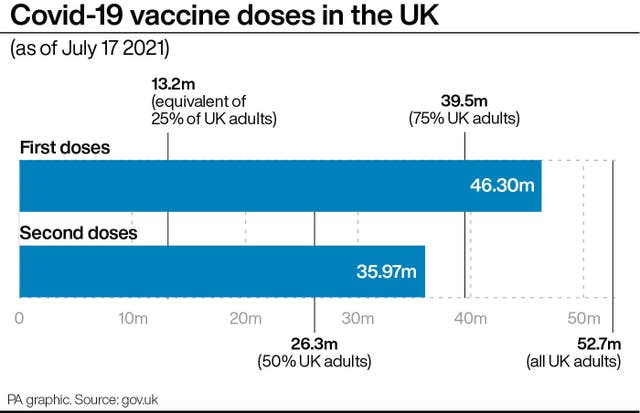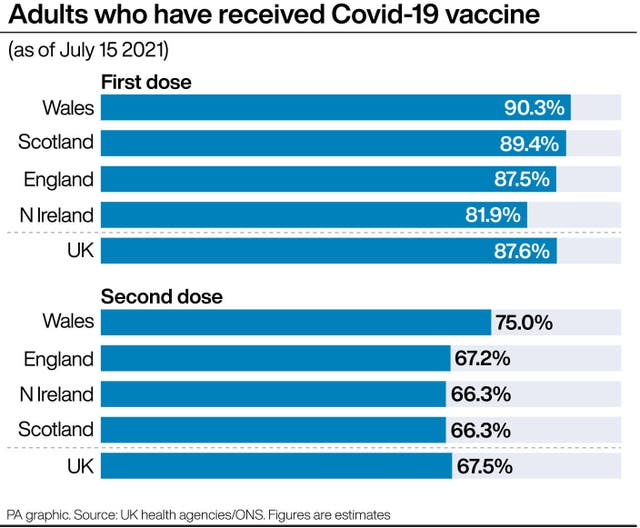What are the plans for giving children a Covid vaccine?
The Medicines and Healthcare products Regulatory Agency last month authorised use of the Pfizer/BioNTech vaccine in children aged 12-15.

Covid vaccines are expected to be rolled out to some children after experts recommended making it available to those who are clinically vulnerable or nearly 18.
Ministers are expected to announce the programme will only be extended to vulnerable children between the ages of 12 and 15 and 17-year-olds who are within three months of their 18th birthday.
Here the PA news agency looks at what the current rules are and what is expected to change.
– What are the current rules on vaccinating children?
The UK’s Medicines and Healthcare products Regulatory Agency (MHRA) last month authorised use of the Pfizer/BioNTech vaccine in children aged 12-15.
The regulator said it is safe and effective in this age group and the benefits outweigh the risks.
The vaccine was already approved for use in people aged 16 and over.
– So can children under 16 get the jab?
Not yet. The Joint Committee on Vaccination and Immunisation (JCVI) will advise on whether children should get the jab.

Under current JCVI guidance, those aged 16 to 18 can be offered a vaccine if they are clinically extremely vulnerable or at high risk of Covid-19 due to underlying health conditions.
– What is the Government expected to announce?
Vaccines minister Nadhim Zahawi said he will deliver a statement to Parliament on Monday on the Government’s response to the advice from the JCVI.
Mr Zahawi suggested most youngsters will not be offered a jab and indicated that the programme will only be extended to vulnerable children between the ages of 12 and 15 and 17-year-olds who are within three months of their 18th birthday.
Mr Zahawi told Sky News: “The Joint Committee on Vaccination and Immunisation have just delivered their advice; we’ll consider it.
“But, suffice to say, they have looked very closely, especially at children who are more vulnerable to serious infection from Covid, children who live with adults who are more vulnerable to serious infection from Covid, and, of course, 17-year-olds who are close to becoming 18 – so three months from their 18th birthday – and we will take that advice before I make a statement to Parliament later today.”
– Why not just vaccinate all children?
Mr Zahawi said there have been cases of inflammation of the heart in some children who have received the vaccine.
He added: “The JCVI are continuing to review that.
“There is new emerging data of children vaccinated in America and elsewhere with a first dose, not yet enough data with a second dose, so they want to look at all the data.”

“On balance, I think the JCVI are coming down on the side of continuing to review all children, healthy children, but wanting to protect the vulnerable children first,” he added.
– Do children need to be vaccinated?
Children rarely develop severe forms of Covid-19, and deaths from the disease are rarer still (fewer than two out of every million worldwide).
But, on rare occasions, young people who have been infected can later develop a dangerous condition called multi-system inflammatory syndrome in children (MIS-C), which can damage the brain and cause hallucinations.
Evidence is also building that jabs can block coronavirus transmission, so vaccinating children could save other people’s lives and help contribute to herd immunity – the point at which most of a population is immune to an infectious disease.
– Are there any side-effects?
The most common side-effects in children aged 12 to 15 are similar to those in people aged 16 and over.
They include pain at the injection site, tiredness, headache, muscle and joint pain, chills and fever.
These effects are usually mild or moderate and improve within a few days.
Recipients can report any side-effects they experience via the MHRA’s existing Yellow Card scheme found on its website.
– Are children in other countries being vaccinated?
The US began inoculating young adolescents in May after its Centre for Disease Control and Prevention (CDC) approved the Pfizer jab for those aged 12-15. More than 600,000 children have been vaccinated so far.
The jab has also been approved for emergency use in Chile, Canada, Japan, the Philippines, Israel and Dubai and the European Union.





